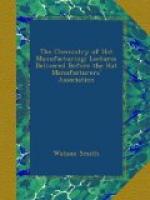LECTURE VI
BORIC ACID, BORAX, SOAP
Boric Acid.—At ordinary temperatures and under ordinary conditions boric acid is a very weak acid, but like silicic and some other acids, its relative powers of affinity and combination become very much changed at high temperatures; thus, fused and strongly heated boric acid can decompose carbonates and even sulphates, and yet a current of so weak an acid as hydrogen sulphide, passed through a strong solution of borax, will decompose it and set free boric acid. Boric acid is obtained chiefly from Italy. In a tract of country called the Maremma of Tuscany, embracing an area of about forty square miles, are numerous chasms and crevices, from which hot vapour and heated gases and springs of water spurt. The steam issuing from these hot springs contains small quantities of boric acid, that acid being one of those solid substances distilling to some extent in a current of steam. The steam vapours thus bursting forth, owing to some kind of constant volcanic disturbance, are also more or less laden with sulphuretted hydrogen gas, communicating a very ill odour to the neighbourhood. These phenomena were at first looked upon by the people as the work of the devil, and priestly exorcisms were in considerable request in the hope of quelling them, very much as a great deal of the mere speech-making at the present time in England on foreign competition and its evils, and the dulness of trade, the artificial combinations to keep up prices, to reduce wages, general lamentation, etc., are essayed in the attempt to charm away bad trade. At length a kind of prophet arose of a very practical character in the form of the late Count Lardarel, who, mindful of the fact that the chemist Hoeffer, in the time of the Grand Duke Leopold I., had discovered boric acid in the volcanic steam jets, looked hopefully beyond the exorcisms of the priests and the superstitions of the people to a possible blessing contained in what appeared to be an unholy confusion of Nature. He constructed tanks of from 100 to 1000 ft. in diameter and 7 to 20 ft. in depth, of such a kind that the steam jets were surrounded by or contained in them, and thus the liquors formed by condensation became more and more concentrated. These tanks were arranged at different levels, so that the liquors could be run off from one to the other, and finally to settling cisterns. Subsequently the strong liquors were run to lead-lined, wooden vats, in which the boric acid was crystallised out. Had the industry depended on the use of fuel it could never have developed, but Count Lardarel ingeniously utilised the heat of the steam for all the purposes, and neither coal nor wood was required. Where would that Tuscan boric acid industry have been now had merely the lamentations of landowners, fears of the people, and exorcisms of the priests been continued? Instead of being the work of the arch-enemy of mankind,




